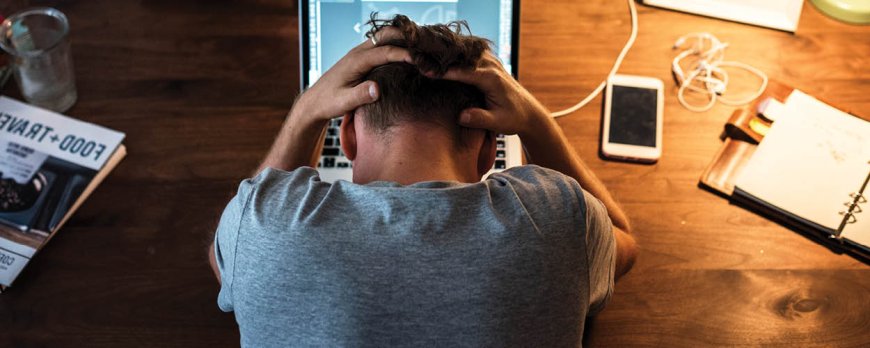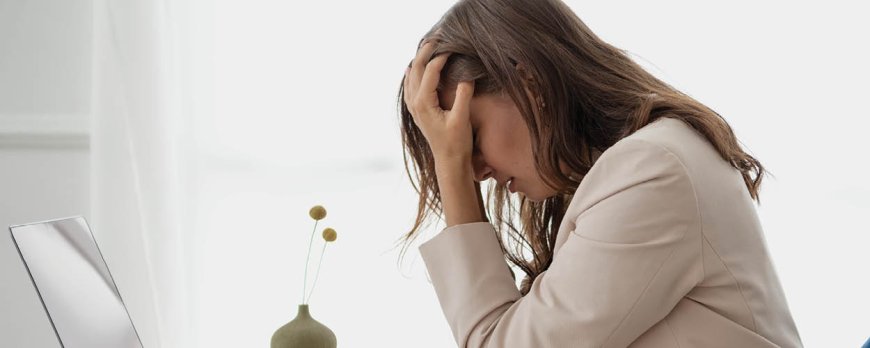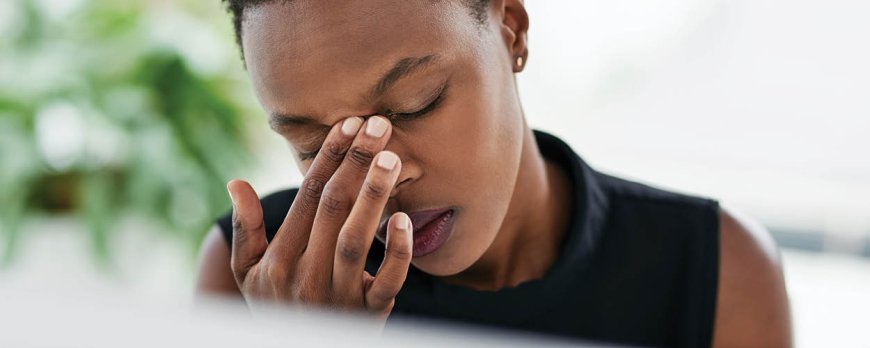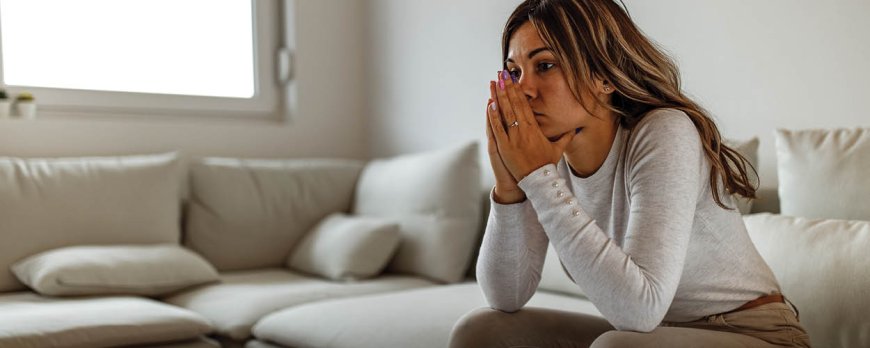How to Calm Anxiety?
Explore effective strategies on 'How to calm anxiety'. Learn from experts and find the relief you need in everyday life. Empower your mental wellbeing today.

How to Calm Anxiety?
Anxiety can be overwhelming, but there are proven techniques that can help you find relief and regain control of your mental wellbeing.
Key Takeaways:
- Accept your anxiety instead of fighting it to reduce its impact.
- Recognize and understand your anxiety without self-criticism.
- Perform well despite anxiety by implementing effective strategies.
- Reality-check anxious thoughts to gain perspective and reduce anxiety.
- Share your anxiety with someone you trust to find support and understanding.
Recognize and understand your anxiety
One of the first steps in calming anxiety is to recognize and understand the feelings and thoughts associated with it. It's important to acknowledge that anxiety is a normal response and not criticize yourself for feeling anxious. By accepting your anxiety, you can begin to work through it and find effective ways to manage it.
Engaging in self-reflection and being aware of your triggers can help you gain a better understanding of your anxiety. Take note of situations, thoughts, or events that tend to increase your anxiety levels. By identifying these triggers, you can develop strategies to cope with them more effectively.
Additionally, consider seeking the support of a trusted individual or therapist. Talking about your anxiety with someone you trust can provide a sense of relief and help you gain perspective. They can offer guidance and support as you navigate through your anxious thoughts and emotions.
Techniques to calm anxious thoughts:
- Practice deep breathing exercises to slow down your breathing and promote relaxation.
- Engage in visualization techniques by creating mental images of peaceful and calming scenes.
- Try muscle relaxation exercises, such as progressive muscle relaxation, to release tension and promote a sense of calmness.
- Challenge and reframe negative or anxious thoughts by questioning their validity and replacing them with more positive or realistic thoughts.
Remember, everyone's experience with anxiety is unique, and what works for one person may not work for another. It's essential to explore different techniques and strategies to find what helps you personally calm your anxiety.

Accept Your Anxiety
Accepting your anxiety is a crucial step in finding relief and regaining control over your mental wellbeing. It may feel counterintuitive, but accepting your anxiety rather than fighting it can actually help reduce its impact on your life. Rather than criticizing yourself for feeling anxious, remind yourself that anxiety is a normal response to certain situations and experiences.
Performing well with anxiety is possible. It's important to recognize that anxiety does not have to hinder your abilities or limit your potential. By acknowledging your anxiety and learning strategies to cope with it, you can overcome your fears and achieve your goals. One helpful technique is to perform a reality check on your anxious thoughts. By questioning the validity and likelihood of your anxious thoughts, you can gain a more balanced perspective and reduce anxiety.
Sharing your anxiety with someone you trust can provide immense relief and support. Opening up about your struggles to a friend, family member, or therapist can help you feel understood and validated. It's important to remember that you are not alone in your experiences, and seeking support is a sign of strength.
Engaging in Relaxation Techniques
- Deep Breathing: Take slow, deep breaths, inhaling deeply through your nose and exhaling slowly through your mouth. Focus on the sensation of your breath filling your lungs and release any tension with each exhale.
- Visualization: Imagine yourself in a calm and peaceful place, such as a beach or a forest. Visualize the details of your surroundings, engaging all your senses. Allow yourself to experience the serenity and tranquility of that space.
- Muscle Relaxation: Progressive muscle relaxation involves tensing and then releasing each muscle group in your body. Start from your toes and work your way up, tensing each muscle for a few seconds and then releasing it. This technique helps release built-up tension and promotes deep relaxation.
Practicing self-care is essential for managing anxiety. Taking care of yourself physically, emotionally, and mentally can greatly reduce anxiety symptoms. Ensure you are getting enough sleep, eating nutritious meals, and engaging in activities that bring you joy and relaxation.
Reducing caffeine intake can also benefit those with anxiety. Caffeine is a stimulant that can increase heart rate and promote feelings of restlessness and anxiety. Consider cutting back on caffeinated beverages like coffee, tea, and energy drinks, or opt for decaffeinated alternatives.
Nurturing your relationships with loved ones can provide a strong support system during times of anxiety. Spend quality time with friends and family, engage in activities together, and communicate openly about your feelings and experiences. Building and maintaining meaningful connections can help alleviate anxiety and foster a sense of belonging.
Setting boundaries and avoiding procrastination can also contribute to managing anxiety. Creating structure in your daily life and prioritizing tasks can reduce feelings of overwhelm and help you stay organized. Break tasks into smaller, manageable steps, and give yourself permission to take breaks when needed.
Yoga and mindfulness practices have been shown to be effective in calming anxiety. Engaging in mindful activities like meditation, yoga, or tai chi can help reduce stress and promote relaxation. These practices focus on being present in the moment and cultivating a sense of calm and inner peace.
While these techniques can be helpful in managing anxiety, it's important to remember that everyone's experience is unique. If anxiety symptoms persist or significantly interfere with your daily life, it may be beneficial to seek professional help. Therapists, counselors, and psychiatrists can provide guidance and support tailored to your specific needs, and medication may be recommended as part of a comprehensive treatment plan.
Perform well with anxiety
It is possible to perform well even with anxiety, and this section will guide you on how to achieve that. Recognizing and accepting your anxiety is the first step towards managing it effectively. Instead of criticizing yourself for feeling anxious, remind yourself that anxiety is a normal response to certain situations. By acknowledging and accepting your anxiety, you can begin to take control of it.
A reality check can be a helpful tool in reducing anxiety. When you find yourself consumed by anxious thoughts, take a moment to question their validity. Ask yourself if these thoughts are realistic and likely to happen. Challenging the negative and irrational thoughts can help you gain perspective and alleviate anxiety.
Sharing your anxiety with someone you trust is another beneficial strategy. It allows you to express your feelings and concerns, while also receiving support and reassurance. Remember that you are not alone in experiencing anxiety, and opening up to someone can provide a sense of safety and understanding.
In addition to these techniques, engaging in relaxation exercises can significantly reduce anxiety. Deep breathing exercises, visualization, and muscle relaxation techniques are all effective ways to calm your mind and body. These practices help activate the body's natural relaxation response, promoting a sense of calm and well-being.
To manage anxiety, it is crucial to prioritize self-care. Taking care of yourself physically, mentally, and emotionally can help reduce anxiety levels. This may involve engaging in activities that bring you joy, practicing mindfulness or meditation, and ensuring you get enough rest and sleep.
Remember, managing anxiety naturally requires a holistic approach. In addition to the strategies mentioned, it is important to reduce caffeine intake, nurture your relationships, set boundaries, and avoid procrastination. If anxiety symptoms persist or interfere with your daily life, seeking professional help through therapy and medication may be necessary to manage your anxiety effectively.

Reality check your anxious thoughts
Anxious thoughts can often be irrational, and by conducting a reality check, you can challenge their validity and find relief. When you catch yourself spiraling into negative thoughts or catastrophic scenarios, take a moment to step back and question the likelihood of those thoughts actually coming true. Ask yourself if there is any evidence to support your anxious beliefs, or if they are simply driven by fear and worry.
Create a list of rational responses to counteract your anxious thoughts. For each anxious thought, write down a more realistic and balanced perspective. Remind yourself of past experiences where your anxious predictions did not come true, and focus on the facts rather than letting your imagination run wild. By challenging and reframing your anxious thoughts, you can gain a clearer perspective and reduce anxiety.
Example:
Anxious thought: "I'm going to fail this presentation and embarrass myself in front of everyone."
Rational response: "I have prepared thoroughly for this presentation and have successfully delivered similar presentations in the past. I will focus on my strengths and speak confidently."
Remember that reality checking takes practice, and it may not always eliminate anxiety entirely. However, it can significantly reduce its impact and help you regain a sense of control over your thoughts and emotions.
Combining reality checking with other anxiety relief techniques, such as deep breathing or journaling, can further enhance the effectiveness of managing anxious thoughts naturally. With time and consistent practice, you can develop skills to challenge and overcome anxious thinking, leading to a calmer and more balanced state of mind.
Share your anxiety with someone you trust
Talking about your anxiety with someone you trust can provide immense relief and support during challenging times. Opening up to a friend, family member, or therapist allows you to express your feelings and fears without judgment. It can help you gain a fresh perspective on your anxiety and provide a sense of validation that you are not alone in your struggles.
When sharing your anxiety, it's important to choose someone who will listen attentively and respond empathetically. This person should be someone you feel comfortable with and trust to keep your conversations confidential. During these discussions, try to be open and honest about your experiences, sharing both the physical and emotional aspects of your anxiety.
Having someone by your side who understands and supports you can make a significant difference in managing anxiety. They can offer guidance, reassurance, and practical advice based on their own experiences or knowledge. Remember, you don't have to face anxiety alone, and reaching out to someone you trust can be the first step towards finding relief.
Engage in relaxation techniques
Relaxation techniques are powerful tools for soothing anxiety and promoting a sense of calm. When practiced regularly, they can help reduce stress and alleviate anxiety symptoms. Here are some effective relaxation techniques to incorporate into your daily routine:
- Deep breathing: Take slow, deep breaths, focusing on filling your lungs with air and then exhaling slowly. This can help activate your body's relaxation response and reduce anxiety.
- Visualization: Close your eyes and imagine yourself in a peaceful, calming place. Visualize every detail, from the sounds and smells to the colors and textures. This imagery can help relax your mind and body.
- Muscle relaxation: Progressive muscle relaxation involves tensing and then relaxing each muscle group in your body, starting from your toes and working your way up to your head. This technique can help release tension and promote a deep sense of relaxation.
In addition to these techniques, consider engaging in activities that promote relaxation, such as taking a warm bath, listening to soothing music, or practicing mindfulness meditation. Find what works best for you and make it a regular part of your self-care routine. Remember, relaxation techniques are not a one-size-fits-all solution, so it's important to experiment and find what resonates with you.
Note: It's important to remember that relaxation techniques may not completely eliminate anxiety, and seeking professional help through therapy and medication may be necessary if anxiety symptoms persist or interfere with daily life. These techniques can be used as complementary strategies to help manage anxiety naturally.

Practice Self-Care
Taking care of yourself is essential in managing anxiety and creating a foundation for overall well-being. Here are some tips to incorporate self-care into your daily routine:
- Set aside time for relaxation: Engage in activities that help you relax and unwind, such as taking a warm bath, reading a book, or practicing meditation.
- Establish healthy boundaries: Learn to say no when you feel overwhelmed and protect your time and energy. Prioritize your needs and make self-care a non-negotiable part of your routine.
- Get enough sleep: Make sleep a priority and establish a bedtime routine that promotes better sleep quality. Aim for 7-9 hours of quality sleep each night.
- Engage in physical activity: Regular exercise can help reduce anxiety and improve your overall well-being. Find activities that you enjoy, such as walking, yoga, or dancing.
Practicing Gratitude and Mindfulness
Incorporating gratitude and mindfulness practices into your daily life can also help manage anxiety:
- Practice gratitude: Take a few moments each day to reflect on the things you are grateful for. Write them down in a gratitude journal or simply express them silently in your mind.
- Mindful breathing: Whenever you feel anxious, take deep breaths and focus on your breath as it enters and leaves your body. This simple practice can help calm your mind and bring you back to the present moment.
- Engage your senses: Pay attention to the sights, sounds, smells, tastes, and textures around you. Engaging your senses can help ground you in the present and reduce anxiety.
- Practice self-compassion: Be kind and gentle with yourself. Treat yourself with the same kindness and understanding you would offer to a loved one.
Remember, practicing self-care is an ongoing process. Find what works best for you and make it a priority. If anxiety symptoms persist or interfere with your daily life, don't hesitate to seek professional help through therapy or medication.
Reduce Caffeine Intake
Caffeine can exacerbate anxiety, and reducing its consumption can have a positive impact on managing anxiety levels. Here are some tips to help you decrease your caffeine intake:
- Gradually reduce consumption: Instead of completely cutting out caffeine all at once, try gradually decreasing your intake over time to avoid withdrawal symptoms.
- Swap caffeinated drinks: Replace your regular coffee or energy drinks with decaffeinated or herbal alternatives, such as herbal teas or caffeine-free beverages.
- Opt for alternatives: Explore non-caffeinated alternatives that can provide a similar energy boost, such as drinking water, eating fruits, or engaging in physical activities.
- Read labels: Pay attention to the caffeine content in various food and drinks, including chocolate, sodas, and certain medications, to ensure you are aware of how much caffeine you are consuming.
- Establish a routine: Create a caffeine reduction plan and stick to it. Set specific goals for yourself, such as limiting your caffeine intake to a certain number of cups per day, and track your progress.
By reducing your caffeine intake, you may experience a reduction in anxiety symptoms and feel more in control of your emotions. Remember, it's important to be patient with yourself during this process and seek professional help if needed.
Incorporating herbal teas into your routine
Herbal teas are a great alternative to caffeinated beverages and can help soothe anxiety. Here are some herbal teas known for their calming properties:
- Chamomile: Known for its relaxing effects, chamomile tea can help promote sleep and reduce anxiety.
- Lemon balm: Lemon balm tea has been used for centuries to ease stress and anxiety, providing a sense of calm and relaxation.
- Lavender: Lavender tea has a soothing aroma and can help alleviate anxiety and promote better sleep.
- Peppermint: Peppermint tea has a refreshing flavor and can help relax muscles, relieving tension associated with anxiety.
- Passionflower: Passionflower tea has been traditionally used to reduce anxiety and improve sleep quality.
Incorporating these herbal teas into your daily routine can contribute to a calming effect and support your efforts in managing anxiety naturally.

Nurture Your Relationships
Strong and supportive relationships can significantly contribute to reducing anxiety and promoting overall well-being. When facing anxiety, it's important to lean on the support and understanding of friends and family. Spend quality time with loved ones, engaging in activities that bring joy and create a sense of connection.
Here are some anxiety relief techniques that involve nurturing relationships:
- Open up and share your anxiety with someone you trust. By expressing your feelings, you can alleviate the burden of anxiety and gain valuable perspective and support.
- Engage in active listening and empathetic conversations with your loved ones. Encourage open dialogue, allowing both parties to express their concerns and emotions without judgment.
- Plan regular social activities with friends and family. Whether it's going for a walk, having a meal together, or participating in a shared hobby, spending time with loved ones can provide a sense of comfort and distract from anxious thoughts.
Remember, a strong support system can make a significant difference in managing anxiety naturally. Don't hesitate to reach out and nurture your relationships to create a safe and understanding environment.
Set boundaries and avoid procrastination
Establishing clear boundaries and minimizing procrastination can help alleviate anxiety by creating a sense of control and structure. When we have well-defined boundaries, we know our limits and can prioritize our tasks without feeling overwhelmed. This can prevent anxiety-inducing situations and promote a greater sense of calm.
To set boundaries effectively, start by identifying your priorities and allocating specific time frames for each task. Break larger tasks into smaller, manageable steps to make them less daunting. Avoid overcommitting yourself and learn to say no when necessary. By setting realistic expectations for yourself, you can reduce anxiety caused by excessive pressure.
Create a schedule
One valuable strategy for managing anxiety is to create a schedule that helps you stay organized and on track. Use a planner or a digital calendar to map out your daily, weekly, and monthly responsibilities. By having a clear plan of action and allocating specific time slots for each task, you can minimize uncertainty and feel more in control of your time and workload.
- Break down tasks into manageable chunks
- Set realistic deadlines
- Prioritize tasks based on importance and urgency
- Allocate breaks to rest and recharge
By following a structured schedule, you can avoid the stress of last-minute rush or indecision, allowing you to focus on completing your tasks efficiently and effectively.
Avoiding procrastination
Procrastination can be a major source of anxiety, as it often leads to increased pressure and a sense of being overwhelmed. To combat procrastination, start by identifying the reasons behind it. Are you afraid of failure or perfectionism? Are you struggling with motivation? By understanding the root causes, you can develop effective strategies to overcome procrastination.
- Break tasks into smaller, more manageable steps
- Set realistic and achievable goals
- Utilize time management techniques, such as the Pomodoro Technique
- Eliminate distractions by creating a conducive work environment
- Reward yourself for completing tasks
By taking proactive steps to overcome procrastination, you can reduce anxiety and increase productivity, leading to a greater sense of accomplishment and peace of mind.
Explore yoga and mindfulness
Incorporating yoga and mindfulness into your routine can be effective in managing anxiety and fostering a sense of inner peace. These practices encourage a deep connection between the mind and body, helping to calm the nervous system and reduce anxiety symptoms. Here are some anxiety relief techniques and natural remedies for anxiety that you can try:
- Practice yoga: Engaging in yoga poses, such as child's pose or downward-facing dog, can help release tension and promote relaxation. The combination of gentle movements, deep breathing, and focus on the present moment can alleviate anxiety and promote a sense of calm.
- Try mindfulness meditation: Mindfulness involves paying attention to the present moment without judgment. By practicing mindfulness meditation, you can cultivate a greater awareness of your thoughts and emotions, allowing you to observe them without getting caught up in negative or anxious thinking patterns.
- Use guided imagery: Guided imagery involves visualizing calming and peaceful scenes, which can help redirect your focus away from anxious thoughts. You can listen to guided imagery recordings or create your own mental images to promote relaxation and reduce anxiety.
- Practice deep breathing exercises: Deep breathing exercises, such as diaphragmatic breathing, can activate the body's relaxation response and reduce anxiety. By focusing on your breath and taking slow, deep breaths, you can calm your mind and body.
Remember, managing anxiety naturally involves finding what works best for you. It may be helpful to explore different yoga styles, meditation techniques, or relaxation exercises to discover what resonates with you. Incorporating these practices into your regular routine can provide ongoing support and aid in managing anxiety in a holistic way.
If your anxiety symptoms persist or interfere with your daily life, it is important to seek professional help through therapy or medication. A mental health professional can provide guidance and support tailored to your specific needs, ensuring you receive the appropriate treatment and care.
Conclusion
Calming anxiety requires consistent effort and a combination of techniques, but with practice and perseverance, it is possible to find relief and regain control of your mental well-being. Accepting anxiety rather than fighting it is an important first step. Recognize and understand your anxiety without self-criticism, reminding yourself that it is a normal response. Performing well with anxiety is also achievable by embracing techniques such as reality checking your anxious thoughts.
Sharing your anxiety with someone you trust can provide a sense of safety and understanding. Engaging in relaxation techniques like deep breathing, visualization, and muscle relaxation can help alleviate anxiety symptoms. Prioritizing self-care, reducing caffeine intake, and spending quality time with friends and family are also vital in managing anxiety naturally.
Setting boundaries and avoiding procrastination can reduce anxiety-inducing pressures, while exploring activities like yoga and mindfulness can promote relaxation. However, if anxiety symptoms persist or interfere with daily life, it is crucial to seek professional help through therapy and medication.
Remember, you are not alone in your journey to calm anxiety naturally. By implementing these strategies and seeking support when needed, you can regain control of your mental well-being and live a more peaceful and fulfilling life.
FAQ
How can I calm anxiety?
To calm anxiety, it is important to accept it rather than fight it, as fighting anxiety can make it worse. Recognize and understand your anxiety, and don't criticize yourself for feeling anxious. Remind yourself that anxiety is a normal response and that you can still perform well with anxiety. Try doing a reality check and questioning the likelihood of your anxious thoughts. Share your anxiety with someone you trust and remind yourself that you are safe. Engaging in activities such as deep breathing, visualization, and muscle relaxation can also help alleviate anxiety. It is important to practice self-care, reduce caffeine intake, spend time with friends and family, create boundaries, avoid procrastination, and try activities like yoga and mindfulness. Seeking professional help through therapy and medication may be necessary if anxiety symptoms persist or interfere with daily life.
Why is it important to recognize and understand my anxiety?
Recognizing and understanding your anxiety is important because it allows you to acknowledge and validate your feelings. By understanding your anxiety, you can develop strategies to manage and reduce its impact. It also helps you differentiate between anxious thoughts and reality, allowing you to gain perspective and reduce anxiety levels.
How can I accept my anxiety?
Accepting your anxiety means acknowledging its presence without judgment or self-criticism. Instead of fighting it, remind yourself that anxiety is a normal response to certain situations and that it doesn't define your abilities or worth. By accepting your anxiety, you can shift your focus towards managing it effectively and finding ways to thrive despite its presence.
Can I still perform well with anxiety?
Yes, you can still perform well despite experiencing anxiety. Anxiety doesn't have to hinder your performance if you learn effective coping strategies and techniques. By accepting and understanding your anxiety, you can develop methods to manage it and maintain focus on your goals. Practice relaxation techniques, challenge negative thoughts, and seek support from trusted individuals to help you perform well despite anxiety.
How can I reality check my anxious thoughts?
Reality checking your anxious thoughts involves questioning their validity and likelihood. When anxious thoughts arise, try asking yourself if there is concrete evidence to support them or if they are based on assumptions or exaggerations. Consider alternative perspectives and challenge irrational beliefs. By reality checking your anxious thoughts, you can reduce their impact and regain a sense of control.
Why should I share my anxiety with someone I trust?
Sharing your anxiety with someone you trust can provide emotional support and validation. It helps you feel understood and less alone in your experiences. It also allows the other person to offer reassurance, advice, or simply be a listening ear. Sharing your anxiety can contribute to a sense of safety and help alleviate feelings of isolation.
How can relaxation techniques help alleviate anxiety?
Engaging in relaxation techniques such as deep breathing, visualization, and muscle relaxation can trigger a relaxation response in your body, which counteracts the physical symptoms of anxiety. These techniques help slow down your heart rate, decrease tension, and promote a sense of calm. Regular practice of relaxation techniques can reduce overall anxiety levels and provide you with effective tools to manage anxiety in the moment.
Why is self-care important in managing anxiety?
Self-care is vital in managing anxiety because it prioritizes your mental and emotional well-being. By taking care of yourself, you are better able to cope with stressors and anxiety triggers. Engaging in self-care activities such as exercise, healthy eating, getting enough sleep, and practicing hobbies or relaxation techniques allows you to recharge and build resilience against anxiety.
Why should I reduce caffeine intake to manage anxiety?
Caffeine is a stimulant that can increase heart rate, trigger jitters, and worsen anxiety symptoms. By reducing or eliminating caffeine intake, you can minimize the physical effects of anxiety and promote a calmer state of mind. Opt for decaffeinated beverages or herbal teas instead to support anxiety management.
How can nurturing relationships help in managing anxiety?
Nurturing relationships with friends and family can provide emotional support, understanding, and a sense of belonging. Social connections act as a buffer against anxiety and stress. Spending time with loved ones, engaging in meaningful conversations, and seeking their support can help alleviate anxiety and foster a sense of security and well-being.
Why is setting boundaries and avoiding procrastination important in managing anxiety?
Setting boundaries and avoiding procrastination can help reduce anxiety by providing structure, organization, and a sense of control. Establishing clear boundaries helps protect your time and energy, preventing overwhelm. Prioritizing tasks and avoiding procrastination minimizes the build-up of stress and anxiety-inducing pressures, allowing you to approach responsibilities in a more manageable way.
How can yoga and mindfulness help calm anxiety?
Yoga and mindfulness practices have been shown to reduce anxiety by promoting relaxation and a focus on the present moment. Engaging in yoga poses, breathwork, and meditation can help release tension, improve self-awareness, and cultivate a sense of inner calm. Regular practice of yoga and mindfulness techniques can enhance overall well-being and provide effective tools for managing anxiety.

































































































































